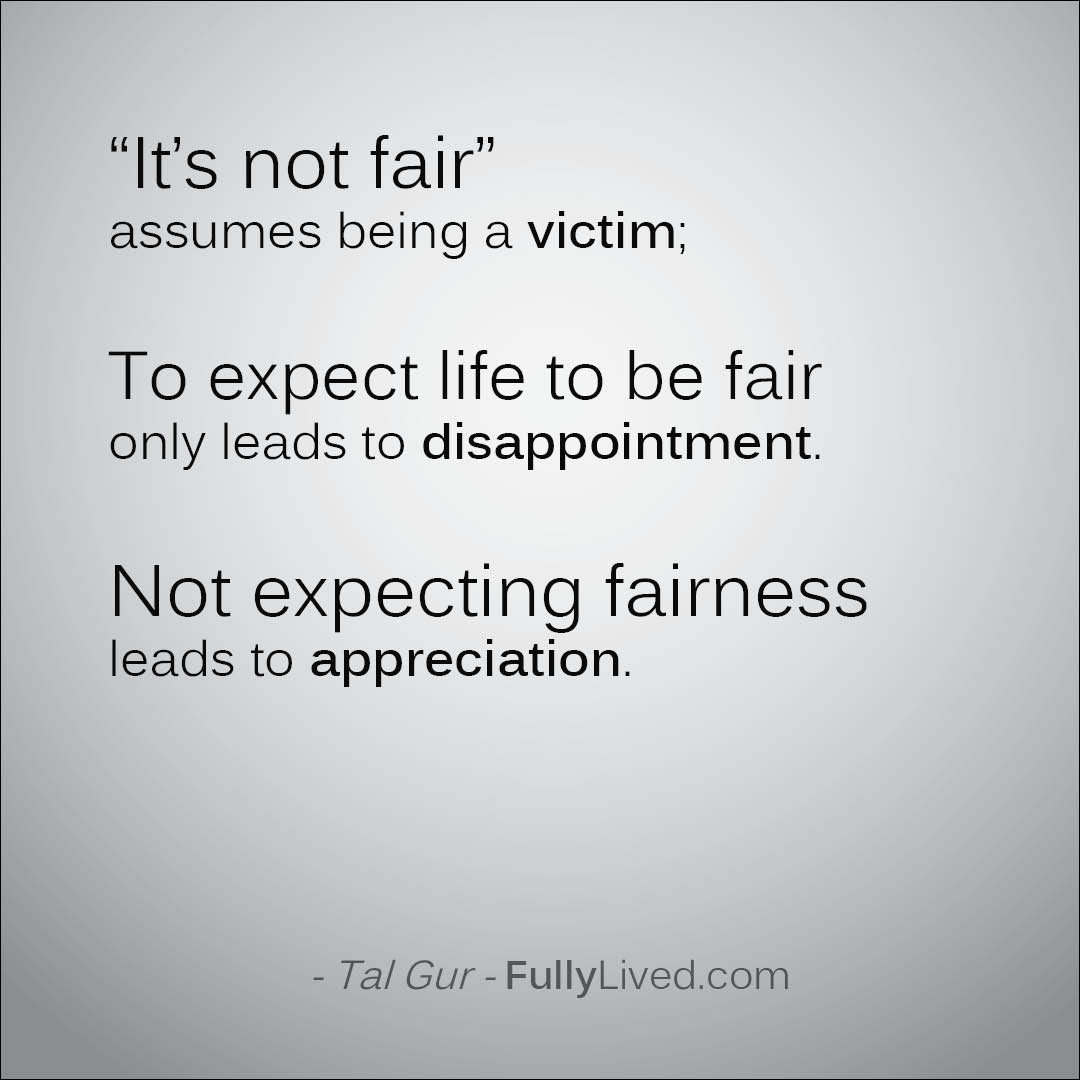It’s not fair assumes being a victim; To expect life to be fair only leads to disappointment. Not expecting fairness leads to appreciation
Essentially, the core of this quote is all about perspective and the way we approach the challenges and opportunities life presents us.
The initial part, "It's not fair assumes being a victim," suggests that if we constantly approach life with the mindset that things aren't fair, we're placing ourselves in a victim role. This victim mentality can be self-defeating, as it causes us to focus on the negative, robbing us of the power and agency we have to shape our own lives.
The next part, "To expect life to be fair only leads to disappointment," points out the harsh reality that life, in its unpredictable, often random complexity, isn't always fair. We all know this deep down, but it's human nature to crave fairness and justice. It's a natural response to want everything to be equal, predictable, and neatly sorted. However, holding onto the belief that life should always play out in a fair manner is likely to result in disappointment, simply because life isn't always balanced.
The concluding section, "Not expecting fairness leads to appreciation," offers a proactive alternative. By letting go of the expectation of fairness, we free ourselves from that burden of disappointment. Instead, we open ourselves up to the world as it is, rather than how we think it should be. This switch in mentality allows us to appreciate what we have and what we achieve, rather than bemoaning what we don't have or haven't achieved. It gives us the power to adapt and thrive in whatever circumstances we find ourselves in.
So, in essence, this quote is a call to shift our perspective from a victim mentality that focuses on life's perceived injustices, to a more adaptable, resilient mindset that appreciates life in all its complexities. It's about accepting life on its terms and finding the value and lessons in our unique experiences, regardless of whether they seem 'fair' or not.
Is there a historical example that illustrates the message of the quote?
One historical example that illustrates the message of the quote "It's not fair assumes being a victim; To expect life to be fair only leads to disappointment. Not expecting fairness leads to appreciation" is the life of Mahatma Gandhi, the leader of India's independence movement against British rule in the early 20th century.
Gandhi fought for justice and equality, but he recognized that life is inherently unfair. He understood that expecting fairness in every situation would only lead to disappointment and frustration. Instead, he embraced the idea of not being a victim and took responsibility for his actions and choices.
Throughout his struggle for India's independence, Gandhi faced numerous challenges and injustices. He experienced violence, imprisonment, and was subjected to various forms of discrimination. However, he did not let these circumstances define him or turn him into a victim.
Gandhi's approach was rooted in nonviolence and peaceful resistance. He believed in the power of love, compassion, and understanding to bring about change. By not expecting fairness, Gandhi was able to appreciate the progress he made, even in the face of adversity.
His philosophy of nonviolence and his ability to remain positive and appreciative, despite the unfairness he encountered, inspired millions of people around the world. Gandhi's approach demonstrated that focusing on appreciation rather than fairness can lead to personal growth, resilience, and the ability to create meaningful change.
* If you’re seeking extra motivation and inspiration on your journey of personal growth, I recommend taking a look at my SMART growth goals page, This page offers thousands of goal ideas that can assist in the establishment of new aspirations and the attainment of greater heights in one's life. In fact, it was instrumental in my creation of a list of 100 goals, which I pursued for a decade.
Chief Editor
 Tal Gur is an author, founder, and impact-driven entrepreneur at heart. After trading his daily grind for a life of his own daring design, he spent a decade pursuing 100 major life goals around the globe. His journey and most recent book, The Art of Fully Living, has led him to found Elevate Society.
Tal Gur is an author, founder, and impact-driven entrepreneur at heart. After trading his daily grind for a life of his own daring design, he spent a decade pursuing 100 major life goals around the globe. His journey and most recent book, The Art of Fully Living, has led him to found Elevate Society.

























